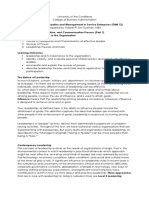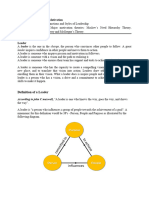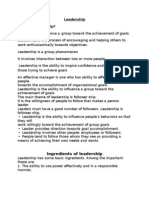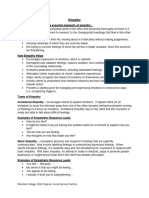0 ratings0% found this document useful (0 votes)
75 viewsWhat Is Leadership
What Is Leadership
Uploaded by
jawad mughalLeadership is a process where an individual influences others towards achieving an objective by providing direction and guidance. It requires building confidence and motivating followers to work towards organizational goals. Effective leadership is important as it supports teams in accomplishing tasks, develops individuals and team spirit, provides motivation and feedback, and facilitates change and maintaining discipline within an organization. Leadership depends on personal traits of the leader, the situation, and is a relationship between leaders and followers.
Copyright:
© All Rights Reserved
Available Formats
Download as DOCX, PDF, TXT or read online from Scribd
What Is Leadership
What Is Leadership
Uploaded by
jawad mughal0 ratings0% found this document useful (0 votes)
75 views10 pagesLeadership is a process where an individual influences others towards achieving an objective by providing direction and guidance. It requires building confidence and motivating followers to work towards organizational goals. Effective leadership is important as it supports teams in accomplishing tasks, develops individuals and team spirit, provides motivation and feedback, and facilitates change and maintaining discipline within an organization. Leadership depends on personal traits of the leader, the situation, and is a relationship between leaders and followers.
Original Description:
leadership skills
Original Title
Leadership
Copyright
© © All Rights Reserved
Available Formats
DOCX, PDF, TXT or read online from Scribd
Share this document
Did you find this document useful?
Is this content inappropriate?
Leadership is a process where an individual influences others towards achieving an objective by providing direction and guidance. It requires building confidence and motivating followers to work towards organizational goals. Effective leadership is important as it supports teams in accomplishing tasks, develops individuals and team spirit, provides motivation and feedback, and facilitates change and maintaining discipline within an organization. Leadership depends on personal traits of the leader, the situation, and is a relationship between leaders and followers.
Copyright:
© All Rights Reserved
Available Formats
Download as DOCX, PDF, TXT or read online from Scribd
Download as docx, pdf, or txt
0 ratings0% found this document useful (0 votes)
75 views10 pagesWhat Is Leadership
What Is Leadership
Uploaded by
jawad mughalLeadership is a process where an individual influences others towards achieving an objective by providing direction and guidance. It requires building confidence and motivating followers to work towards organizational goals. Effective leadership is important as it supports teams in accomplishing tasks, develops individuals and team spirit, provides motivation and feedback, and facilitates change and maintaining discipline within an organization. Leadership depends on personal traits of the leader, the situation, and is a relationship between leaders and followers.
Copyright:
© All Rights Reserved
Available Formats
Download as DOCX, PDF, TXT or read online from Scribd
Download as docx, pdf, or txt
You are on page 1of 10
What is leadership:
Leader is an integral part of work and social life.
In any situation, when people want to accomplish some goal, a leader is
required. Leadership occurs in all formal and informal situations. In a
non-formal situation, such as a group of friends, leadership behavior
occurs when one individual takes lead in most of the group activities and
influences people to work towards common goals.
People have to be guided to contribute to goals with zeal and confidence.
“Zeal is ardor, earnestness and intensity in the execution of work;
confidence reflects experience and technical ability.” The ability to
influence the behavior of others is known as leadership. Leaders exploit
human potential and transform it into output.
Leadership is a process by which a person influences others to
accomplish an objective and directs the organization to make it cohesive
and coherent. It is the ability to build confidence and zeal among people
and create an urge to be led. It inspires confidence and support among
group members to achieve the organizational goals.
Leadership is the process by which an executive imaginatively directs,
guides and influences the work of others in choosing and attaining
specified goals, by mediating between individuals and the organization
in a manner that both obtain maximum satisfaction. Dynamic and
effective leadership leads an organization towards success.
“A leader is one who conducts, acts as a guide to others in action or
opinion, one who takes the lead in any enterprise or movement, one who
is ‘followed’ by disciples or adherents, the most eminent member of a
profession, a person of eminent position and influence.”
Nature of leadership:
1. Leadership depends upon personal traits:
Everybody cannot be a leader. Best known managers can be ineffective
leaders and poor managers can be very good leaders. Managers are
different from leaders. A person can be a good leader if he has
characteristics like popularity, confidence, intelligence, social and inter-
personal skills etc.
2. Situational:
Leadership style varies with the situation. A person with same traits may
adopt autocratic style of leadership in one situation and democratic style
in another situation. Situation plays important role in determining the
style of leadership.
3. Leadership vs. management:
Leadership is different from management. While management assumes
hierarchical relationship amongst individuals, leaders and followers may
not be related to each other through the formal chain of command.
4. Leadership is a function:
Leadership is a function of the leader, follower and the situation.
Mathematically, L= f (l, f, s)
where L = Leadership; I = leader; f = follower; s = situation
Leadership is determined by characteristics of the leader, the team and
the situations that prevail in the organization.
5. Role model:
Leaders are role models for their followers. Subordinates will not be
loyal if leaders are not supportive. Leaders should cooperate with the
followers if they want the followers to cooperate with them. The
followers tend to behave as they are behaved with. Leaders should set
example before followers and be their ideal. People should follow him
voluntarily by virtue of what he is and what he does and not because of
the position.
6. Leaders are also followers:
Leaders also have someone above them to whom they report. As they
demand subordination from followers, they must show subordination to
their leaders.
7. Pervasive function:
Leadership is not related to business organizations only. Wherever a
person influences the behavior of others, he exercises leadership. An
educational institution, a charitable organization, military organization,
hospital or a family at home require leadership sometime or the other.
8. Leaders should have followers:
A person can be called a leader if he has followers. If people agree to be
led and influenced by someone, that person can be called a leader.
9. Leadership and power:
A leader derives potential to influence the behavior of others through
power. A leader can derive power from various sources.
(a) Legitimate power:
It is the power by virtue of position in the organizational hierarchy. An
employee knows that his superiors have power to issue him directions.
(b) Reward power:
It is the power to give rewards in the form of bonus, increments,
promotion etc. for positive contribution to organizational goals.
(c) Coercive power:
It is the power to punish undesirable tasks. A salary cut or a vacation cut
can enforce people conform to directions of the leaders.
(d) Expert power:
Leader enjoys this power by virtue of his expertise and skill. A tax
expert, for example, can solve tax related matters of his fellow workers,
superiors and subordinates.
(e) Information power:
It is the power to have access to organizational information. More the
information one has about the organization structure, more is his
informational power.
(f) Referent power:
While legitimate, coercive and reward power are relatively concrete
sources of power based on objective aspects of organizational culture,
referent power is abstract based on identification, loyalty and intimation.
A leader enjoys this power because of his skills and traits. People follow
leaders because they like to associate themselves with them. They react
favorably and behave the way leaders want them to behave.
(g) Connection power:
Leader enjoys this power because of connection with influential people.
People follow a leader who has contacts with people of high social and
economic status to elicit favors out of such persons.
10. Leadership aims at goal achievement:
Leaders are dynamic persons who set high standards of performance.
They also help the followers to achieve the targets. Leaders trigger a
person’s “will to do,” show the way and guide members towards group
accomplishment.
Why leadership is important:
Leadership is important because of the following reasons:
1. Task support:
Leaders support their followers by assembling organizational resources
and help them accomplish their tasks and meet the standards of
performance.
2. Psychological support:
Leaders help the followers accomplish the organizational tasks. They
promote the followers to work with zeal and confidence. They make
followers realize their capabilities and guide, counsel and coach them
whenever necessary.
This promotes morale of employees and healthy interaction amongst
members of the group. This also develops disciplined thinking in the
organization, productivity, growth and stability.
3. Develops individuals:
The willingness, enthusiasm and confidence that leaders build in the
followers for accomplishment of individual and organizational goals
results in their growth and development.
4. Builds team spirit:
No individual can work alone. Leaders develop team spirit amongst
followers to work collectively and coordinate their activities with
organizational activities. A leader works as captain of the team. He
develops understanding amongst followers, resolves individual and
group conflicts and harmonizes individual goals with organizational
goals. He creates forces of synergy and converts individual output into
collective output.
5. Motivation:
Leaders motivate employees to take up challenging jobs. They combine
ability with willingness and drive people to action. They exploit their
potential to work and convert their desire into performance. They also
develop commitment, loyalty and dedication amongst the followers and
create an environment conducive for their development.
6. Provides feedback:
When people work towards well-defined targets, they want feedback on
their performance. Leaders provide them this feedback. They guide them
continuously to improve their results by correcting deviations in their
work performance.
7. Facilitates change:
Effective leaders convince members about the need and benefits of
organizational change. The change process can be smoothly carried out
by overcoming factors that produce resistance to change.
8. Maintain discipline:
Leadership is a powerful influence to enforce discipline in the
organization. It can enforce formal rules and regulations. Members
follow rules with commitment and loyalty if leaders have confidence in
them. Leaders promote team work, change their attitude towards work,
develop good human relations, facilitate interaction amongst members
and maintain discipline in the organization.
Formal leader and informal leaders:
Successful leaders and effective leaders:
9 ways to develop your leadership skills:
A good leader needs discipline. Developing discipline in your
professional (and personal) life is a must in order to be an effective
leader, and to inspire others to be disciplined as well. People will judge
your capacity to lead by the amount of discipline you display at work.
Demonstrate discipline at work by always meeting deadlines, keeping
appointments, and ending meetings on time. If you are naturally
disorganized, then you may have your work cut out for you, but you can
always start small: try implementing good habits at home, like waking
up early and getting daily exercise, and work your way up from there.
Take on more projects
A great way to develop your leadership skills is to take on more
responsibility. You don't have to take on more than you can handle, but
you do need to do more than simply what's covered in your job
description if you want to grow. Stepping out of your comfort zone is
the only way you will learn anything new, and doing so will get you
noticed by executives as someone who takes initiative.
Learn to follow
A true leader has no problem yielding control to another person when
appropriate. You should not feel threatened when someone disagrees
with you, questions your thinking, or puts forth ideas of their own. Keep
an open mind and give merit where merit is due. It won't always be easy,
but if you learn to value and respect others on your team, they'll be more
likely to step up to the plate for you.
Develop situational awareness
A mark of a good leader is someone who can see the bigger picture, and
anticipate problems before they occur. This is a valuable skill to have
when handling complex projects with tight deadlines. The ability to
foresee and provide suggestions for avoiding potential problems is
invaluable for a leader. This ability also helps you recognize
opportunities that others overlook, which will certainly earn you
recognition.
Inspire others
Being a leader means you are part of a team, and as a leader you should
be able to motivate and inspire those you work with to collaborate as
best they can. When a team member needs encouragement or guidance,
offer it. Sometimes, all a person needs is someone to listen and be
sympathetic.
Keep learning
The best path to becoming a good leader is to always keep learning new
things. It keeps your mind sharp, and your skills fresh. It primes you for
new challenges that may come your way, which is always a good thing
in a leader.
Empower your teammates
No one is the best at everything, and the sooner you realize that, the
sooner you can learn to be a good leader. Delegating tasks to others not
only frees you up for things you do well, it also empowers other people
on your team.
Resolve conflicts
Don't be a manager from hell! Not everyone will get along all the
time. Instead of ignoring interpersonal conflicts, hoping they will go
away, address it by talking to those involved privately. Also, be open to
reassigning team members if the conflict can't be resolved.
Best leader in world:
PROPHET MUHAMMAD (PEACE BE UPON HIM); GREATEST
LEADER AND BLESSING FOR ALL MANKIND.
You might also like
- Tef Test Devaluation de Francais Tef 250 Activites French Edition by Sylvie PonsDocument7 pagesTef Test Devaluation de Francais Tef 250 Activites French Edition by Sylvie PonsMoeez Saleem0% (1)
- Steven Pinkers The Sense of StyleDocument4 pagesSteven Pinkers The Sense of StylePeace Mantra100% (2)
- 7.1.3 Final Exam - ExamDocument4 pages7.1.3 Final Exam - ExamSophia Arredondo100% (1)
- Leadership EssayDocument5 pagesLeadership EssayPaulVanSickle100% (1)
- Presentation On Leadership and ManagementDocument28 pagesPresentation On Leadership and ManagementSAGAR ADHAO100% (8)
- Social Media Pitch Proposal - PublicisDocument42 pagesSocial Media Pitch Proposal - PublicisЕлизаветаNo ratings yet
- Leadership and The Filipino YouthDocument2 pagesLeadership and The Filipino YouthErichelle EspineliNo ratings yet
- Mass Effect 2 - Prima Official Game GuideDocument284 pagesMass Effect 2 - Prima Official Game GuideVera Barbara Catalano100% (4)
- script (4)Document9 pagesscript (4)David BrainardNo ratings yet
- lesson-7-mgt101aDocument3 pageslesson-7-mgt101aShaina leigh RagudoNo ratings yet
- Ob-Unit 3-Notes-FinalDocument26 pagesOb-Unit 3-Notes-FinaljoycyNo ratings yet
- Module 4 - THM 12 - Part 1Document9 pagesModule 4 - THM 12 - Part 1Djared James MinasNo ratings yet
- Leadership: Meaning, Characteristics and FunctionsDocument6 pagesLeadership: Meaning, Characteristics and Functionsnitish kumar twari100% (1)
- Unit-4 Leadership Motivation ControllingDocument41 pagesUnit-4 Leadership Motivation ControllingSakshi RelanNo ratings yet
- POM M6-Ktunotes - inDocument55 pagesPOM M6-Ktunotes - inyadhuNo ratings yet
- M4.1Document16 pagesM4.1hodiseNo ratings yet
- LeadershipDocument53 pagesLeadershipcute_little4596% (72)
- B M Unit IVDocument17 pagesB M Unit IVMohithNo ratings yet
- Leadership & DelegationDocument14 pagesLeadership & DelegationAngelie Sanchez100% (1)
- Leadership What Is Leadership ?Document15 pagesLeadership What Is Leadership ?Krunal Sangharajka100% (1)
- Leadership What Is Leadership?Document10 pagesLeadership What Is Leadership?sisay2001No ratings yet
- Principle of Management LeadershipDocument8 pagesPrinciple of Management Leadership41033No ratings yet
- Term-Paper About Leadership (Literature Review)Document15 pagesTerm-Paper About Leadership (Literature Review)AeintNo ratings yet
- Unit 5 KMBN101Document14 pagesUnit 5 KMBN101misete6622No ratings yet
- Chapter 6 LeadingDocument14 pagesChapter 6 Leadingየገጠር ልጅNo ratings yet
- OTB - Lecture Notes 4 - Leadership and ManagementDocument16 pagesOTB - Lecture Notes 4 - Leadership and Managementadan awale100% (1)
- Qualities or Characteristics of a successful LeaderDocument5 pagesQualities or Characteristics of a successful LeaderKhushi SrivastavaNo ratings yet
- Ob Unit 4Document14 pagesOb Unit 4sreeja pericherlaNo ratings yet
- PPM Notes Unit - IVDocument9 pagesPPM Notes Unit - IVHemanth ParakhNo ratings yet
- LeadershipDocument9 pagesLeadershipDrishti SultaniaNo ratings yet
- LeadersDocument4 pagesLeadersSisay SenaNo ratings yet
- Leadership Part 1 161715191017950Document14 pagesLeadership Part 1 161715191017950n76311238No ratings yet
- Leadership and CEO Training - Module 1Document29 pagesLeadership and CEO Training - Module 1Mohammed FaizanNo ratings yet
- leadershipDocument6 pagesleadershipdasrajpratim09No ratings yet
- Project LeadershipDocument50 pagesProject LeadershipShalini Agarwal100% (1)
- M6 - LeadershipDocument7 pagesM6 - Leadershipjunel gurayNo ratings yet
- Leadership & CEO Traning - Module 1Document29 pagesLeadership & CEO Traning - Module 1yamoka2001No ratings yet
- Leader Born or Made: Presented byDocument30 pagesLeader Born or Made: Presented byManjunath DupatiNo ratings yet
- Leadership TrainingDocument36 pagesLeadership TrainingQUIBOL, CHAREL R.No ratings yet
- Module 3A LeadershipDocument8 pagesModule 3A LeadershipBittu DasNo ratings yet
- Unit 5 KMB 101Document30 pagesUnit 5 KMB 101harsh patelNo ratings yet
- Module 2 Organizational LeadershipDocument61 pagesModule 2 Organizational LeadershipRuby Ann RosauroNo ratings yet
- Chapter 8Document2 pagesChapter 8Mark Anthony Mores FalogmeNo ratings yet
- Understanding LeadershipDocument75 pagesUnderstanding Leadershipmichelle banacNo ratings yet
- HBO, Topic 6Document16 pagesHBO, Topic 6rechellematinNo ratings yet
- CFLM2 Prelim topics 1Document17 pagesCFLM2 Prelim topics 1milquenieremacalipsay24No ratings yet
- Leadership NotesDocument13 pagesLeadership Noteskishor kumarNo ratings yet
- CFLM 2 Ms - Jessa SingcoyDocument105 pagesCFLM 2 Ms - Jessa SingcoyCedrick Oliver OrtizNo ratings yet
- CFLM-2-MODULE-1Document25 pagesCFLM-2-MODULE-1leomilsergio024No ratings yet
- 10 Types of Power in LeadershipDocument5 pages10 Types of Power in LeadershipMuhamadIlhamSamudraNo ratings yet
- CH 3 LeadershipDocument10 pagesCH 3 LeadershipAbdullah Al Mamun TusherNo ratings yet
- LEADERSHIPDocument4 pagesLEADERSHIPWeng Garrote EvangelistaNo ratings yet
- Ob Unit 4Document11 pagesOb Unit 4shaik9391469742No ratings yet
- What Is LeadershipDocument3 pagesWhat Is LeadershipSaurabh Khanna100% (3)
- Chapter 08Document157 pagesChapter 08Ankita ShuklaNo ratings yet
- Leadership Concept & TheoryDocument22 pagesLeadership Concept & TheoryJay PaulNo ratings yet
- Chapter 2Document12 pagesChapter 2k.srikanth ReddyNo ratings yet
- Chapter 3 NSTPDocument15 pagesChapter 3 NSTPAlthea Faye Rabanal100% (2)
- Asian Perspective, Leadership Roles, Challenges To Leadership Construct, Finding and Creating Effective Group LeaderDocument28 pagesAsian Perspective, Leadership Roles, Challenges To Leadership Construct, Finding and Creating Effective Group LeaderPriya SharmaNo ratings yet
- Leadership and CommunicationDocument15 pagesLeadership and CommunicationEssam El SheikhNo ratings yet
- Lead with Impact Practical Tips for Elevating Your Leadership SkillsFrom EverandLead with Impact Practical Tips for Elevating Your Leadership SkillsNo ratings yet
- Grade 11 Q4Document6 pagesGrade 11 Q4louela marie lopenaNo ratings yet
- Normal Curve Using TI84 - and - ExcelDocument8 pagesNormal Curve Using TI84 - and - ExcelMae LustivaNo ratings yet
- Bomix Catalogue Release AgentDocument16 pagesBomix Catalogue Release Agentherry prasetyoNo ratings yet
- EmpathyDocument2 pagesEmpathyAfolabi QauzeemNo ratings yet
- MEASUREMENTDocument18 pagesMEASUREMENTSalahodin Limbuna TitayNo ratings yet
- Quality Assurance Plan - hd-99Document6 pagesQuality Assurance Plan - hd-99quality japtechNo ratings yet
- Curriculum Vitae: Personal DetailsDocument3 pagesCurriculum Vitae: Personal DetailsMarkus Koko Nur BudiantoNo ratings yet
- Ocgl Main Gs SolvedDocument17 pagesOcgl Main Gs Solvedoxygenn006No ratings yet
- Reading Explorer 3 3rd Edition Nancy Douglas download pdfDocument81 pagesReading Explorer 3 3rd Edition Nancy Douglas download pdfpalapazayati100% (3)
- Eng111 Unit IDocument19 pagesEng111 Unit ILumactod EarthanNo ratings yet
- DGDGDGDGDGDGDGDGDGDocument4 pagesDGDGDGDGDGDGDGDGDGNguyen PhuongNo ratings yet
- GRI 303: Water and Effluents 2018Document24 pagesGRI 303: Water and Effluents 2018Ana LauraNo ratings yet
- Biodegradable Wire Rope Coating GreaseDocument2 pagesBiodegradable Wire Rope Coating GreasedhowardjNo ratings yet
- CS302 Mid-Sem Online Examination - Attempt Review-2Document10 pagesCS302 Mid-Sem Online Examination - Attempt Review-2Satyam TripathiNo ratings yet
- DSL 600manualDocument2 pagesDSL 600manualMonica CurpasNo ratings yet
- 54 Ki 098Document3 pages54 Ki 098Sagar SawantNo ratings yet
- Yearbook 2024Document304 pagesYearbook 2024abhishekiist2023No ratings yet
- HT - ButylglycolDocument5 pagesHT - Butylglycolxibs2009No ratings yet
- EavesdroppingDocument2 pagesEavesdroppingalayna.salyersNo ratings yet
- Art InvokedDocument18 pagesArt InvokedWYNNE JOY ALQUIZARNo ratings yet
- New Product Catalog 2022Document92 pagesNew Product Catalog 2022Paulo César BritoNo ratings yet
- Myoglobin: Submitted By: Sakshi Sharma R O L L N O - 5 8 5 5 Section-B, 3 YearDocument16 pagesMyoglobin: Submitted By: Sakshi Sharma R O L L N O - 5 8 5 5 Section-B, 3 YearSakshi SharmaNo ratings yet
- Alfa Laval Oil Separators, Purifier MAB 103B-24: Functions & UsesDocument13 pagesAlfa Laval Oil Separators, Purifier MAB 103B-24: Functions & UsesSyam NairNo ratings yet
- Dyson - PrésentationDocument3 pagesDyson - PrésentationHélène DelvinquièreNo ratings yet
- Numerical Solutions of A Class of Second Order Boundary Value Problems On Using Bernoulli PolynomialsDocument9 pagesNumerical Solutions of A Class of Second Order Boundary Value Problems On Using Bernoulli PolynomialsMd. Shafiqul IslamNo ratings yet

























































































